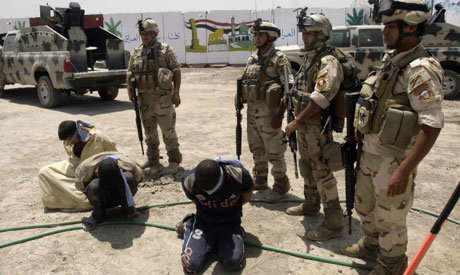
Blindfolded and handcuffed suspected al-Qaida members kneel at an Iraqi army base in Baghdad, Iraq, Wednesday, July 25, 2012. (Photo: AP)
July was the deadliest month in Iraq in almost two years, with 325 people killed in attacks, and included the deadliest day since December 2009, official figures released on Wednesday showed.
The statistics compiled by the health, interior and defence ministries showed that 325 people -- 241 civilians, 40 police and 44 soldiers -- were killed nationwide during the month.
Another 697 people -- 480 civilians, 122 police and 95 soldiers -- were wounded. It was the highest monthly toll given by the government since August 2010, when figures showed 426 people killed and 838 wounded in attacks.
The previous highest official toll this year was for January, when government figures showed that 151 Iraqis were killed and 321 wounded in attacks.
Government figures are usually lower than those given by other sources, but the July toll was higher than a tally kept by AFP based on reports from security and medical officials.
According to the AFP tally, at least 278 people were killed and 683 wounded in July, down slightly from at least 282 fatalities in June.
While violence has decreased from its peak in 2006-2007, attacks still remain near-daily occurrences in Iraq.
Of the 31 days in July, there were attacks on at least 27 of them, with 10 or more people killed in attacks on five separate days -- 39 on July 3, 11 on July 4, 17 on July 22, 113 on July 23, and 23 on July 31.
The July 23 violence, in which some 259 people were also wounded in attacks across the country, was the deadliest single day of violence in Iraq since 126 people were killed on December 8, 2009.
The July 23 wave of violence consisted of at least 29 separate attacks in 19 cities, with most of the unrest concentrated in Baghdad and areas north of the capital.
In the deadliest incidents -- a string of roadside bombs and a car bomb followed by a suicide attack targeting emergency responders in the town of Taji, just north of Baghdad -- at least 42 people were killed and 40 wounded, medical officials said.
Al-Qaeda's front group, the Islamic State of Iraq (ISI), claimed the attacks, saying they were part of a new campaign in the holy Muslim fasting month of Ramadan.
"As part of the new military campaign aimed at recovering territory given up by the Islamic State of Iraq (ISI), the war ministry has sent its sons and the mujahedeen on a sacred offensive during the month of Ramadan," the group said.
"The operation by the jihadists has stunned the enemy and made him lose his head. It has demonstrated the failings of the security and intelligence services," it continued.
Al-Qaeda in Iraq is regarded by Iraqi officials as significantly weaker than at the peak of its strength in 2006 and 2007, but it is still capable of spectacular mass-casualty attacks across the country.
Short link: